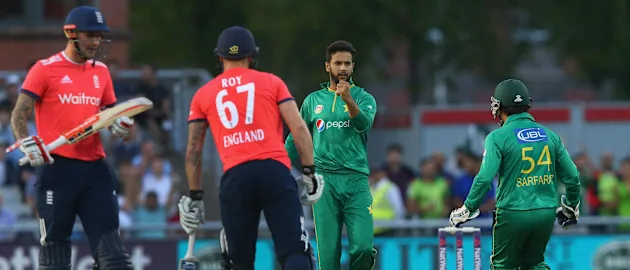England v Pakistan: A Lively History


1955/56 – Cold Water Triggers Cold War
It started with a bucket of water. In December 1955, a strong MCC team led by the upper-crust Donald Carr headed out to Pakistan. They saw themselves as cricketing missionaries; they ended up with a diplomatic soaking.
It wasn’t an official Test tour – that would come later – but the matches were keenly fought, with Pakistan’s victory aided in part by partisan umpiring which even drew the ire of Pakistan’s president-elect, Iskander Mirza. The most merrily one-eyed of the officials was a local card named Idris Begh, who evidently enjoyed the notoriety. Though relations on tour were initially convivial, by midway the mood had turned twitchy, and with defeat imminent after three days of the third ‘Test’, Carr and his players, ‘in high spirits’, moved from a formal dinner that evening to the hotel where Pakistan’s players and umpires were staying, found Begh, sat him down in a chair and, as you do, tipped a bucket of water over him.
Recollections differ of the incident. Some say Begh took it in his stride, laughing along with the prank. Others say he was furious. What’s beyond dispute is that the next day Begh appeared in front of the press with his arm in a sling, the result, he said, of having been manhandled by the players.
It set off a firecracker. As the match concluded, protests raged inside and outside the ground as troops were mobilised to stem the tide. Telegrams were sent to Lord’s, and all future social engagements cancelled as the local press demanded the team be sent home.
A series of profuse apologies from inside the squad, combined with a sustained charm offensive from London, would just about salvage the tour and a fourth and final match was played with Begh as umpire, but the team returned to a scolding from their bosses, with the blame placed squarely at Carr’s doorstep. “The captain,” an MCC statement read, “should have realised that this ragging, although initiated by nothing more than high spirits and with no harmful intent, might be regarded in many quarters as an attack on an umpire.” And so it began…
1969: The Karachi Kibosh
In 1969, England’s cricketers went to Pakistan for a tour no one on either side was especially keen to see take place. Hastily rearranged after the cancelled tour to apartheid South Africa, the mood was tetchy at best, and by the time the teams got to Karachi for the third Test, relations had soured even further. Anti-British feelings were already running high, and when a mob broke down the gates, stormed the pitch and vandalised the playing area, the England team legged it straight for the airport and were out of there that very night. England batsman Tom Graveney later recalled using his bat to repel a couple of pitch intruders. “The two best strokes I made on the whole tour,” he admitted.
1987: Breaking Faisalabad, Gatting v Rana
An on-field, finger-jabbing, insult-laden confrontation between Mike Gatting and Pakistani umpire Shakoor Rana escalated to such an extent that England’s tour of 1987 was thrown into doubt and the Foreign Office were called into action.
Here’s how it went down: Rana calls Gatting a “cheat”, Gatting blows gasket, Rana refuses to come out next morning, Gatting refuses to apologise, England’s board say he must apologise, Gatting – grudgingly, through gritted teeth – apologises, match continues, Gatting and his team left fuming.
The Test & County Cricket Board – forerunners to the ECB – then incense their Pakistani counterparts by giving each member of their squad a bonus of £1000 due to the difficulties faced on the tour and then remove Gatting from the captaincy six months later. England doesn’t tour Pakistan again for 13 years.
1992: Relations Go In Reverse
A few months after Pakistan’s ‘wounded tigers’ ICC World Cup win over England at the MCG, the two teams reconvened in England for a tempestuous Test and ODI series. Pakistan, spearheaded by the great quick bowlers Wasim Akram and Waqar Younis, triumphed over an England team that could barely disguise their displeasure as the summer rolled on at what they perceived to be underhanded ‘dark arts’ tactics.
Eventually, after the ball that Pakistan had been using was switched midway through England’s innings of the August ODI at Lord’s, Allan Lamb went to the Daily Mirror with accusations of widespread ball-tampering dating back to his time playing with the Pakistani fast bowler Sarfraz Nawaz at Northants. The claims were never proven, and Lamb never played for England again.
2006: Hair In The Headlights
Darrell Hair was the centre of attention on Pakistan’s tour of England in 2006.
Hair and his fellow umpire Billy Doctrove lit the touch paper by awarding England five penalty runs on day four of the Oval Test, ruling that Pakistan were guilty of ball-tampering. Captain Inzamam-ul-Haq was livid and his team refused to take the field after the tea break in protest.
The umpires left the field and attempted to cajole the Pakistanis to resume play, but to no avail. The bails were removed and England was declared winner by forfeiture – the first and only instance of the result in Test history. Pakistan did eventually return to the field, 55 minutes after the scheduled resumption, but the umpires insisted that the forfeiture stood.
An ICC hearing later found Pakistan innocent of ball-tampering but banned Inzamam for four ODIs for bringing the game into disrepute. Hair was banned from officiating in international matches, only to be recalled to the elite panel in 2008.
The match was originally awarded to England. This result was amended to an abandonment by the ICC in July 2008 although the change was disputed by the MCC, the custodians of the Laws of Cricket. In January 2009 the ICC voted to reverse their earlier decision and allow the original awarding of the Test to England to stand.
2010: Overstepping The Mark
The first half of Pakistan’s tour of England in 2010 passed without major incident. Stuart Broad did his best, but his 50 per cent match fee fine for throwing the ball at Zulqarnain Haider during the second Test was minor censure compared with the punishments handed down after subsequent events.
A News of the Worldsting that alleged spot-fixing by the Pakistanis during the Lord’s Test overshadowed England’s massive win to clinch the series 3-1. The roles played by Salman Butt, Mohammad Asif and Mohammad Amir in delivering pre-ordered no-balls will forever define that series.
A confrontation in the nets between Jonathan Trott and Wahab Riaz summed up the acrimony that can surface in England v Pakistan contests. Trott was perhaps aggrieved his Lord’s century was tainted by the circumstances surrounding it: suspicion and accusation, ‘twas ever thus.
2016: The ‘Entente Cordiale’ Series
All things considered, it was a great credit to both sides that Pakistan’s first series back on English shores after the dramas of 2010 should be conducted so cordially. Misbah-ul-Haq’s team were determined to present themselves as statesmen, and the English public were pleased to receive them as such.
A humdinger of a Test series, ending with a Pakistani win at The Oval to draw the series, was the perfect way to finish a summer played out in good spirits; and the home crowd, rising as one to salute the Pakistan team’s lap of honour, was fully prepared to embrace the change. Perhaps those scenes will herald a new era of harmonious relations between these old sparring partners. We shall see…


